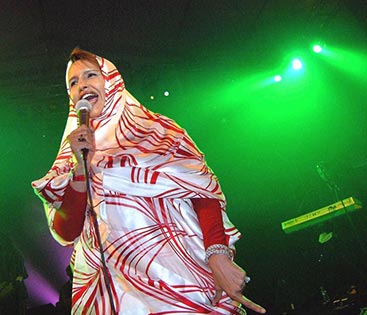Results: 1 to 1 of 1
Malouma
Country Mauritania Genres band fusion roots Website www.malouma-art.mr Festival Sauti za Busara 2008 Recordings 📼 Desert of Eden, 1998; Dunya, 2004; Nour, 2007 (Number 1 on World Music Charts Europe, August and September 2007)
In 1998, with her first album Desert of Eden, the world had the chance to discover in Malouma a talented artist, composer and interpreter, with an extraordinary voice. Her music blends both traditional and modern sounds of Mauritania, where she melds western styles to the Moorish music of the Sahara and adds electric guitars to traditional instruments such as the four-stringed, lute-like tidinit. Malouma is known as a militant singer, and a powerful spokesperson for women's rights.
Anchored in tradition yet resolutely modern, inspired by the songs of the desert and somewhere at the crossroads of West Africa, the Arab and the Berber worlds, Malouma's music is unique. Malouma Mint Moktar Ould Meidah was born in the sixties in Mauritania, into a family of griots. The daughter of Moktar Ould Meidah, a prominent traditional musician as well as a highly skilled poet, she is also the granddaughter of Mohamed Yahya Ould Boubane, another virtuoso of words and the tidinit (a small traditional guitar used by griots).
Malouma started to sing at a very young age, and performed for the first time at the age of twelve, an age when Mauritanian tradition required that daughters of important families be already prepared for a "responsible" life (marriage and self-sufficiency). She started to draw from the traditional repertoire that her parents, especially her father, had enriched. At the age of fifteen, she was already an accomplished griot, not only accompanying her parents but performing whole concerts on her own. In the same period, along with her father, she started to listen to songs by Oum Kalthoum, Abdel Halim Hafez, Fairouz, Nasri Cherns, Sabah, and as she grew up she also discovered another musical style that was not far from the music she mastered: the blues.
Malouma wrote small songs that were popular with young women. But the weight of tradition pushed her into the fetters of marriage and conformism. It took until the late eighties for her to appear on stage again in Mauritania. With a new repertoire, she brought about a true musical revolution among singers. Such pieces as Cyam Ezzaman Tijri and Awdhu Billah disrupted the established order. Or Habibi Habeytou (I Love to Love My Love), a song written when she was sixteen, criticising the trend amongst men of marrying "younger and more charming" wives and turning the current wife out on the street. "That song brought me many problems", she says, a hint of sadness in her voice. "Until the point where I couldn't go out alone. People threw stones at me."
Malouma was aiming to impose a style that drew from the purest tradition and modernised it. The research she undertook was centred on a successful blending of traditional and modern music, the latter providing its instruments and its approach, the first its rich repertoire. Malouma thus became a singer-songwriter, introducing a unity of theme in her songs (oughniya) and not refraining from broaching subjects that were more or less taboo such as love, conjugal life or inequalities. "I was born part of the artist cast, known as griots", she says. "I noticed that there was a lot of injustice against us, so for a long time I have been defending these marginalised casts, and those who are seen as lesser people in society."
In her commitment to encourage justice and equality in Mauritania, she involved herself in activist songs to stir people into action, singing for the AIDS campaigns, for the vaccination of children, for the elimination of illiteracy and for the promotion of women, among other things. While her music soon became popular among the youth, it was rejected at first by the dominating classes. She was introducing too many things at once: the evolution of both customs and culture, even questioning the traditional social order and giving artists an importance they had not had before.
In all these years denouncing inequalities, oppression and injustice, she has become "the singer of the people" (mutribatou echa'b). For all her commitment, she has not forgotten her prime goal, her musical research, to open Mauritanians to the outside world and to make foreigners discover the treasures of her country's national heritage. Rasm, Jraad, Tchaa'i, Nouka... and many more achwaar (traditional pieces) are reinterpreted and reinvented. Malouma has gone even further, trying to harmonise traditional pentatonic Mauritanian music with other folk music forms, notably blues.
"My father was an intellectual who listened to music from all over the world. I remember when I came to Nouakchott with African, Western and Arabic music cassettes, people found it weird, and would ask me where on earth I found this strange music." Despite having a love of all kinds of music, her heart lies with the ardin, the 10 to 14 stringed instrument that is the mainstay of Moorish music. Played only by women, it hails from the nomadic Moors of the country and is passed on down family lines.
Malouma is now a great role model as well as a symbol of national pride, with many followers, not just in Mauritania but around the world.
 with thanks to CulturesFrance
with thanks to CulturesFrance

